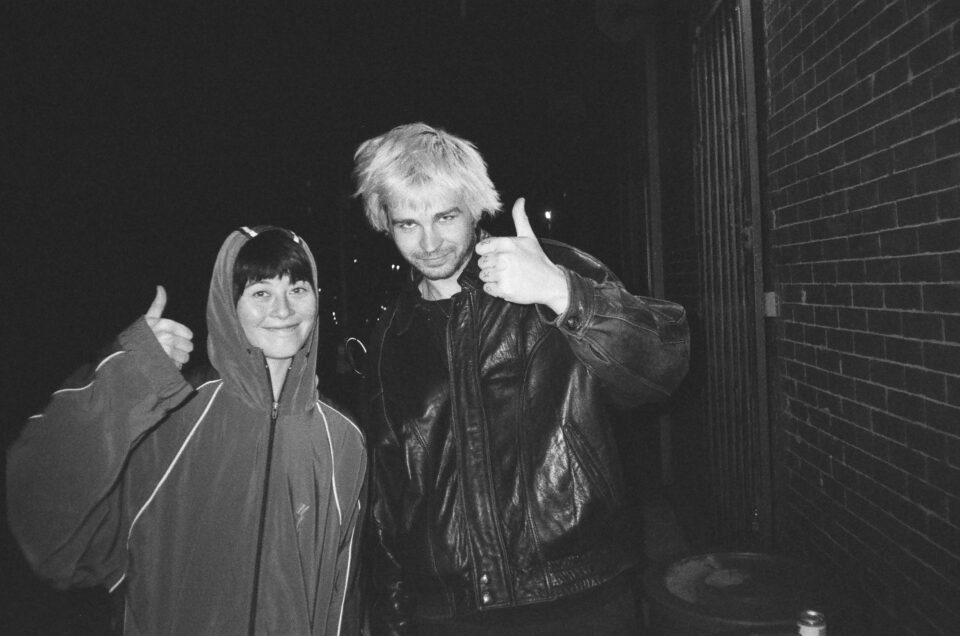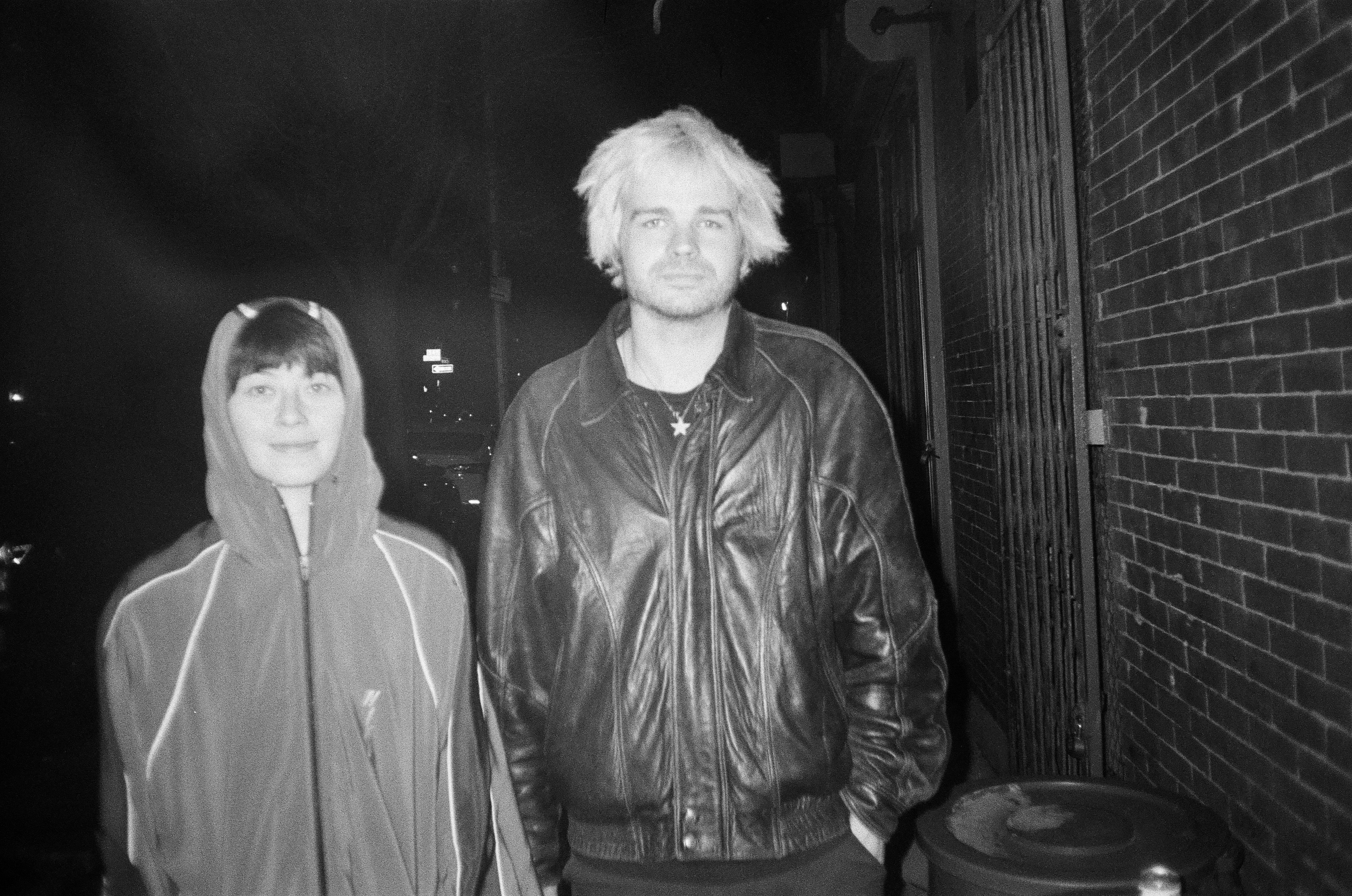Water From Your Eyes, the experimental pop music duo Rachel Brown and Nato Amos, are about to play the first show of their New York City residency. But throughout our chat, the new Matador signees get most excited when recalling a 311 concert they attended last year the same week they opened for ‘90s indie icons Pavement. “Stephen Malkmus very patiently listened to us talk about 311,” Nate explains. Rachel lets out a soft laugh.
We’re tucked into the corner of a decrepit Greenpoint DIY venue that’s covered in graffiti (one earnest scribble sticks out: “Just want to be drunk enuff to cry…sorry that’s stupid”), with leopard print sound buffers hanging on the ceiling. Brown sits on an old foldout chair and Nate is next to them on a ripped leather couch. “We played [with Pavement], and then the next night we saw 311, and then the next night we saw Pavement again,” Amos continues. “So in between the first time we met Stephen Malkmus and the second time we met Stephen Malkmus, we were talking about 311.” He becomes serious for a moment as he admits, “In certain ways, it was the best live concert I’ve ever seen.”
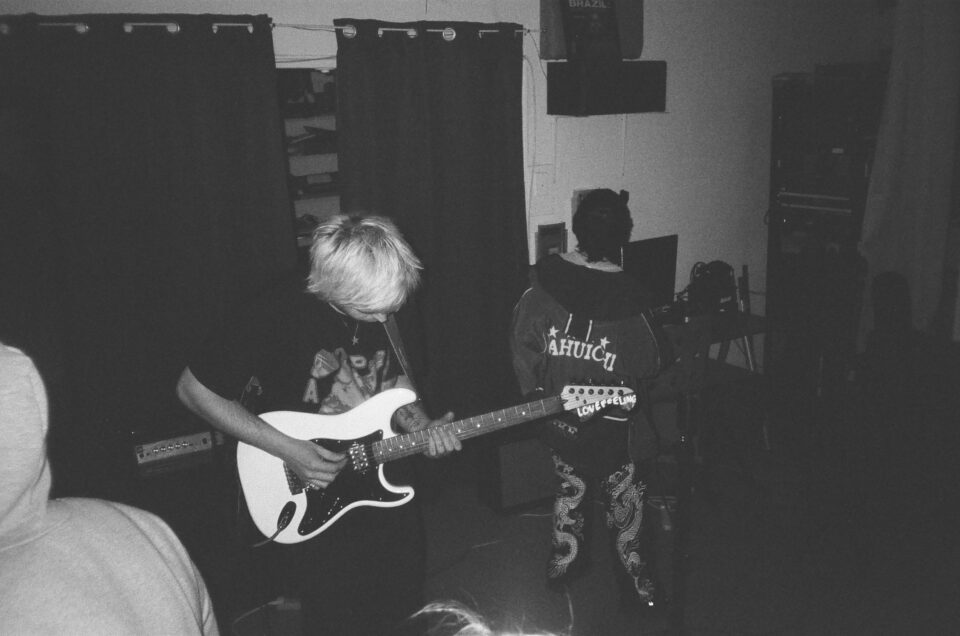
Brown, still in awe months later, reflects: “It was the most drugged-out I’ve felt sober. It was so weird. It was just crazy. They’re crazy.” Amos cuts back in: “They’re all really good at their instruments—like, what they’re putting together doesn’t really make sense. The singer sings about how grateful he is about various things, and the emcee raps about how fucking sick 311 is.” Did Malkmus match their excitement? “No,” Brown replies. “I think he was really tired. It was the fourth show in a row. We kind of just punished him,” they laugh with a slight wheeze.
Meeting Pavement, who Rachel says is one of their favorite bands, was a good experience overall, even if they didn’t bond over feel-good rap-rock. Meanwhile, a flood of visions seemingly comes back from that night as Nate continues on about being in a Terminal 5 crowd of fans donning 311 jerseys. “That was hard to shake. I was thinking about that show for a week at least,” he says. “They did this crazy thing where there was a 10-minute drum solo during which all the crew brought out this whole drumline, like, blind tossing drum sticks—”
“We don’t even smoke weed anymore. We have meetings now…a lot of meetings.” — Rachel Brown
Rachel excitedly interjects, “Dude, they did not blind toss drum sticks.” Nate stands his ground: “Yeah they did—I thought it was my imagination, and then I looked it up online and it’s part of their routine. They do it a lot. But the craziest thing about it is that it was the third or fourth song. It was really early in the show.”
“They did? I didn’t get that on video,” Brown withdraws.
While it is true that 311 have a live drumline routine with blind tossing drumsticks, you can expect nothing that complex from Brown and Amos’ live show. They’ve stripped their live set to only the two of them—they even got rid of their amp. “We’re kind of in this constant process to streamline it and make it easier,” Amos explains. What you can expect is Amos shredding on his white guitar with “Love Feeling” scrawled across it in black duct tape while manipulating an army of pedals. Next to him is a sunglasses-wearing Brown, gripping a microphone while cooly reciting abstract lyrics. Despite their continuously minimized live setup, their presence is still engrossing. At times it sounds like demons are clawing their way out between the strings, climbing up the venue’s walls. The crowd is lost in a trance.
This secret DIY show is one of the few headlining gigs Water From Your Eyes has played over the past year. Last year, supporting their 2021 album Structure, the duo scored an opening slot on tours with Pavement and Interpol. At the top of the year, they announced this set of NYC shows with the news that they signed to heavy-hitter indie label Matador (longtime home to both of those recent tour mates), who had contacted them last summer. A month after the Matador announcement, they revealed that their label debut Everyone’s Crushed would be coming out in May.
“The goal is to try and not really change. But there’s an inevitability to that... It’s about a balance. It turned into what it turned into by us following it around.” — Nate Amos
The former DIY mainstays go back and forth about what’s changed most for them since the signing and global tour exposure. “I used to live in my room, and now I live in random places,” Brown says dryly before laughing at the thought. “The places we pay rent at are the only things that haven’t changed,” Amos adds. Brown: “I actually have less money now, and my car has way more miles.” Amos: “I have slightly more money now—but that’s not saying much, because it’s mostly because I don’t drink anymore.” Brown: “I used to work in television, the commercial industry, and I still work sometimes, but it’s rough on tour. I mean shit, I had never left the country until last April when we went to Canada, and then in May we went to eight countries. I was like “Woaahh [in cartoonish voice], there’s so much to see.” Amos: “We used to just hang out and smoke weed.” Brown: “Yeah we don’t even smoke weed anymore. We have meetings now…a lot of meetings.”
Even though their routines have changed quite a bit, Water From Your Eyes are still processing that this is happening at all. “Even after we signed, we’re like, ‘They’re not serious, there’s no way,’” Rachel pauses, then nods their head. “Turns out they were very serious,” they laugh. “I don't think either of us saw this coming,” Amos adds. “A lot to be thankful for and a lot to be confused by.”
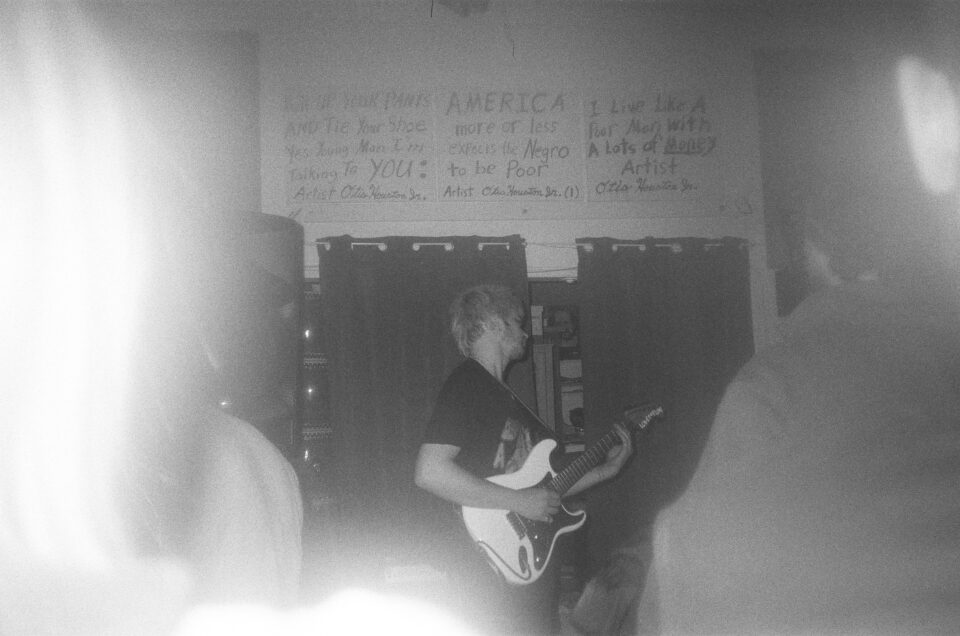
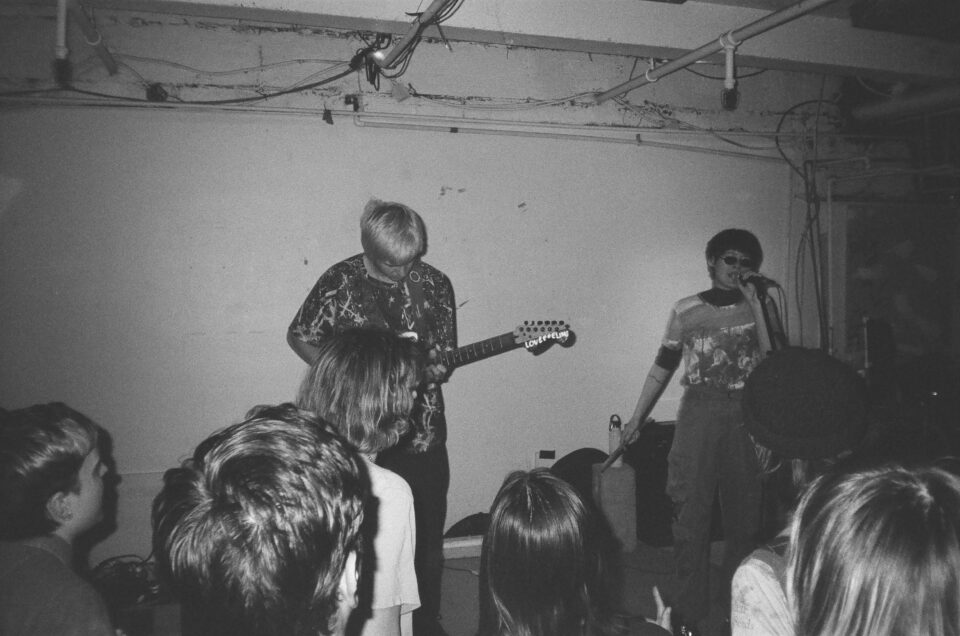
Whether that means playing for one enthusiastic American audience member in Dublin or a crowd of confused Interpol fans elsewhere overseas (“Call it a day, Mate,” one fan of that band messaged them after a set), Water From Your Eyes are adamant about staying true to whatever they’re feeling. “The band turning into what it is, in terms of music and presentation, is the fact that it’s very insular and uncompromisingly what we felt like at any given time,” Amos says. “The goal is to try and not really change. But there’s an inevitability to that. We’ve had a lot more conversations about general direction and where we see it going than we used to. It’s about a balance. It turned into what it turned into by us following it around.”
“It kind of feels…not that it's gone out of control, I mean…it feels like it’s kind of out of control,” Brown chuckles about their new level of exposure. “And not in a bad way—I feel really lucky. It’s weird, people knowing about it and not [just being] this project that our friends know about. It’s not really DIY anymore…” Brown says, trailing off. Nate chimes in: “It’s this thing that’s, like, rolling—there’s a sensation of just kind of being along for the ride.”
“Whenever we do work on more music together, it’ll be kind of like reclaiming ownership a little bit. It’s easy to forget that it’s something that we’re in control of, because now it’s in the hands of so many other people.” — Nate Amos
While they’re still trying to grapple with reality and major changes, there’s a battling instinct that not much—at least about their music, anyway—has to change at all. Sure, there are more spreadsheets and meetings with different teams (which, they admit, they’re still confused as to what they all do), but Water From Your Eyes is still their own unique, instinctual, and innovative experiment. “I think whenever we do work on more music together,” Amos notes, “it’ll be kind of like reclaiming ownership a little bit. It’s easy to forget that it’s something that we’re in control of, because now it’s in the hands of so many other people.”
Brown and Amos haven’t written any new songs since signing to Matador. Their forthcoming album Everyone’s Crushed, which was curated from years of material and finessed within a few weeks, was presented to the label without any intention of changing it if it wasn’t to Matador’s liking (they also offered a collection of covers which, of course, included 311, as well as Sheryl Crow, Chumbawamba, Third Eye Blind, and Al Green). Matador had no notes, and the duo doubt that their latest covers compilation will come out anytime soon.
During our next meetup at the second residency show at the independent bookstore P.I.T., they explain the madness behind Everyone’s Crushed. This nine-track collection is built from songs made previous to and during the writing of their breakthrough album, Structure.
The new album opens with a song named after the preceding one. The track is a snippet from their sound collage record 33:44 which they wanted to rerelease in a new form. “We couldn't figure out what to call it,” Brown begins to explain. “We were trying to figure out how to signify that it was a prelude. But then it was like, Structure preludes Everyone’s Crushed as an album. It would be funny to call it ‘Structure,’ because it’s a prelude.” This is just one example of the thought-out dizziness of their discography: “Structure,” a short-circuiting couplet, is a title track recalling the previous album of recycled material from a 2020 release. Upon hearing Brown’s thought process, Amos shares, “I just lost my shit. I laughed for like five minutes.”
Water From Your Eyes is a delicate balance of pop and noise, but humor is integral to their equation. Another option they were mulling over for the introductory track was Rachel singing the National Anthem. “It was a really funny idea,” Nate explains, “But it sounded way too melted.” Their humor, like their music, is precise. “The original idea with this album was to make, like, the anti-structure,” he continues. “The idea was to make an album that instead of having two matching halves, we would have two halves that were completely different, that could be different bands. The idea was to have a [second] side that was more pop.” But that didn’t exactly end up happening. “It just didn’t play out in a way that we were happy with,” Amos concedes. “It’s a precariously balanced plate on a stick—that’s the way I thought about it.”
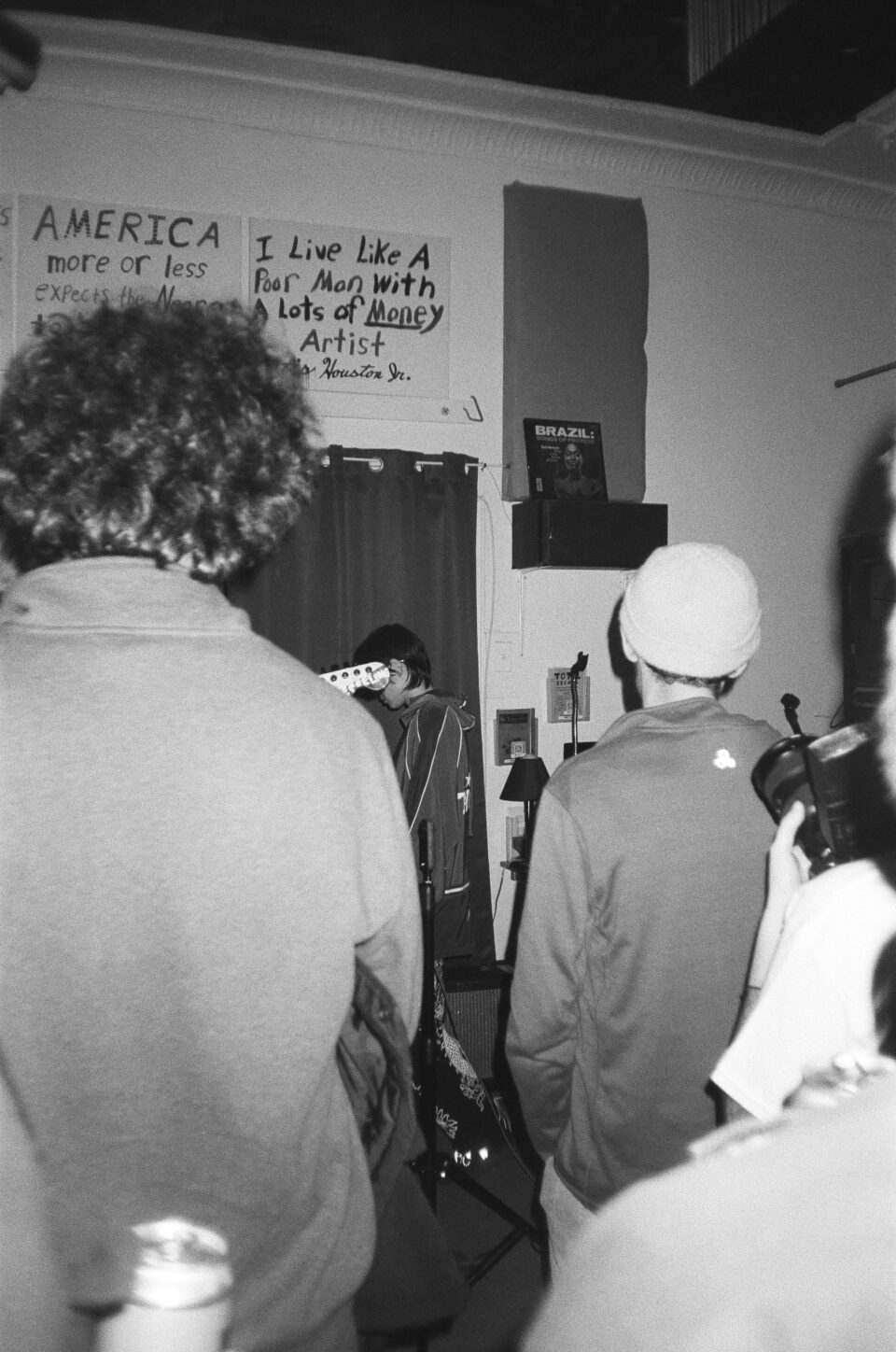
“It’s weird, people knowing about it and not [just being] this project that our friends know about.” — Rachel Brown
It’s a surreal album that takes you on long, labyrinthine hikes. Toward the end, they’re not afraid to pull the conceptual rug out from under you. “By the end of ‘14,’ you almost forget what you're listening to. ‘Buy My Product’ plays, and we're like, ‘Hey, remember, it’s just rock.’” The result is controlled chaos: they’re not afraid to leave their own mark on things—like what Brown describes as a Shakespearean love song, and which Amos associates with Bridgerton (“Remember Not My Name”), or the aforementioned consumerist romp “Buy My Product” that was inspired by car commercials that ends up being, as Amos describes, “an epilogue, an advertisement for the album [within] the album.”
Their final “show” for their NYC residency isn’t actually a show. When the residency idea was brought to them they decided they wanted to go bowling for its final portion. During our first chat, I misunderstand them, thinking they’d be playing a show at the bowling alley. “No, we’ll be playing bowling,” Brown clarifies. It’s this decision that reinforces something Amos had said earlier that felt like a mission statement for the band: “It’s serious about being not serious.” FL
